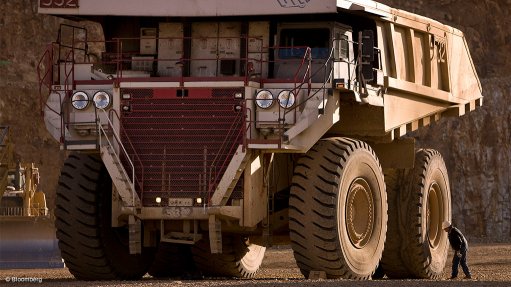
Photo by: Bloomberg
PERTH (miningweekly.com) – Federal Resources Minister Madeleine King has highlighted the significant role that the resources sector will play in global decarbonisation efforts, in a statement to Parliament.
“In order to decarbonise, the world needs our resources industry and our critical minerals,” King said.
“Australia has vast reserves of critical minerals such as lithium, vanadium, rare earth elements (REEs) and silicon, which are essential to make clean-energy technologies such as batteries, solar panels and electric vehicles.
“Our traditional minerals such as iron-ore and bauxite – as inputs to steel and aluminium – will also be integral. Steel in particular will play a key role in all renewables.
“Each new megawatt of solar power requires between 35 t to 45 t of steel, and each new megawatt of offshore wind power requires 120 t to 180 t of steel. In turn, making 180 t of steel to produce a new megawatt of offshore wind power needs at least 288 t of iron-ore and 139 t of metallurgical coal. Similarly, gas will remain crucial for quite some time.
“Some fail to acknowledge this, but Australia’s coal and gas resources are essential for energy security, stability and reliability both domestically and across the Asia-Pacific and will be needed for decades,” King said.
The Minister told Parliament that gas was "absolutely essential" for energy-intensive projects such as extraction, concentration and processing of critical minerals and REEs, which are essential to the energy transition.
“Very high temperatures are required to turn our copper, aluminium, tin, nickel, cobalt, lithium, gold, silver and rare earths into the wires, batteries, magnets, and semiconductors that power clean energy technologies.
“In order to decarbonise, the world needs Australia’s resources industry and our critical minerals.
“No gas means no processing of critical minerals and therefore no batteries for the storage of renewable energy, and that makes the world’s pathway to net zero emissions all the more difficult, perhaps impossible.
“As the energy transition unfolds, if gas supply declines faster than demand; it results in the uneasy combination of high prices and energy insecurity that we’ve seen around the world since Russia’s illegal invasion of Ukraine,” King said.
The Minister noted that while the resources sector would be crucial in enabling the global climate goals, it would also play a role in Australia’s net zero pathway.
“The resources sector is a major emitter, responsible for around one-fifth of Australia’s emissions. It will need to play its part for Australia to meet its national targets. Almost 70% of the resources companies covered by the Safeguard Mechanism have committed to net zero, many well before the Commonwealth government did.
“Many Australian resource projects are already at the leading edge globally in deploying renewables, electrification, methane abatement technologies and carbon capture and storage.
“While it is up to companies to make the investments needed to take these technologies forward, the government will also play a role. Through the Safeguard Mechanism reforms, we are providing the resources sector with the certainty it needs to invest in technologies and decarbonise its operations. And we will play a role through sustained research and development effort and collaboration to bring through low emissions technologies,” she added.